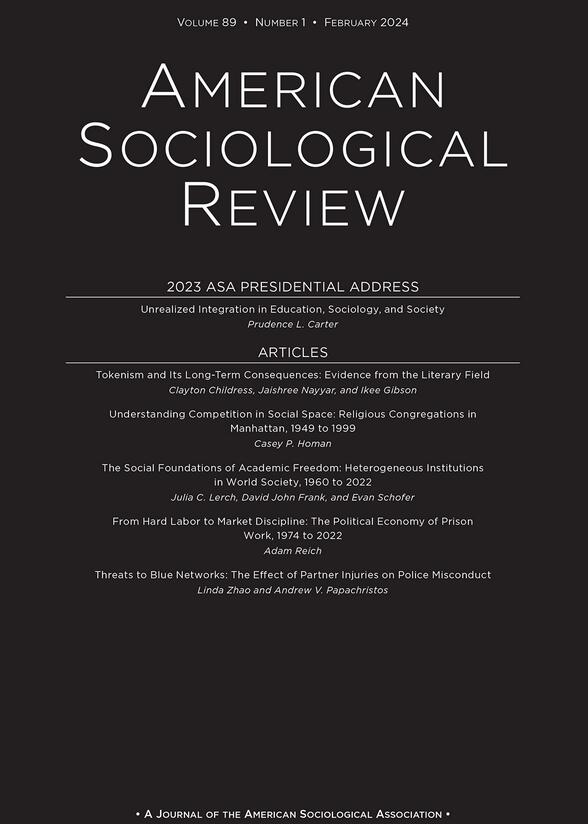Intersecting the Academic Gender Gap: The Education of Lesbian, Gay, and Bisexual America
IF 6.2
1区 社会学
Q1 SOCIOLOGY
引用次数: 14
Abstract
Although gender is central to contemporary accounts of educational stratification, sexuality has been largely invisible as a population-level axis of academic inequality. Taking advantage of major recent data expansions, the current study establishes sexuality as a core dimension of educational stratification in the United States. First, I analyze lesbian, gay, and bisexual (LGB) adults’ college completion rates: overall, by race/ethnicity, and by birth cohort. Then, using new data from the High School Longitudinal Survey of 2009, I analyze LGB students’ performance on a full range of achievement and attainment measures. Across analyses, I reveal two demographic facts. First, women’s rising academic advantages are largely confined to straight women: although lesbian women historically outpaced straight women, in contemporary cohorts, lesbian and bisexual women face significant academic disadvantages. Second, boys’ well-documented underperformance obscures one group with remarkably high levels of school success: gay boys. Given these facts, I propose that marginalization from hegemonic gender norms has important—but asymmetric—impacts on men’s and women’s academic success. To illustrate this point, I apply what I call a “gender predictive” approach, using supervised machine learning methods to uncover patterns of inequality otherwise obscured by the binary sex/gender measures typically available in population research.跨越学术性别差距:美国女同性恋、男同性恋和双性恋者的教育
尽管性别是当代教育分层的核心,但性作为学术不平等的人口层面的轴心,在很大程度上是看不见的。利用最近的主要数据扩展,目前的研究将性行为确立为美国教育分层的核心维度。首先,我分析了女同性恋、男同性恋和双性恋(LGB)成年人的大学毕业率:总体而言,按种族/民族和出生队列。然后,利用2009年高中纵向调查的新数据,我分析了LGB学生在一系列成就和成就衡量标准上的表现。通过分析,我揭示了两个人口统计事实。首先,女性日益增长的学术优势在很大程度上局限于异性恋女性:尽管女同性恋女性在历史上超过了异性恋女性,但在当代群体中,女同性恋和双性恋女性面临着严重的学术劣势。其次,男孩们有据可查的表现不佳掩盖了一个在学校取得显著成功的群体:男同性恋。鉴于这些事实,我认为,被霸权性别规范边缘化对男性和女性的学术成功有着重要但不对称的影响。为了说明这一点,我应用了我所说的“性别预测”方法,使用监督机器学习方法来揭示不平等模式,否则就会被人口研究中通常可用的二元性别/性别测量所掩盖。
本文章由计算机程序翻译,如有差异,请以英文原文为准。
求助全文
约1分钟内获得全文
求助全文
来源期刊

American Sociological Review
SOCIOLOGY-
CiteScore
13.30
自引率
3.30%
发文量
35
期刊介绍:
The American Sociological Association (ASA) is a non-profit membership association established in 1905. Its mission is to advance sociology as a scientific discipline and profession that serves the public good. ASA is comprised of approximately 12,000 members including faculty members, researchers, practitioners, and students in the field of sociology. Roughly 20% of the members work in government, business, or non-profit organizations.
One of ASA's primary endeavors is the publication and dissemination of important sociological research. To this end, they founded the American Sociological Review (ASR) in 1936. ASR is the flagship journal of the association and publishes original works that are of general interest and contribute to the advancement of sociology. The journal seeks to publish new theoretical developments, research results that enhance our understanding of fundamental social processes, and significant methodological innovations. ASR welcomes submissions from all areas of sociology, placing an emphasis on exceptional quality.
Aside from ASR, ASA also publishes 14 professional journals and magazines. Additionally, they organize an annual meeting that attracts over 6,000 participants. ASA's membership consists of scholars, professionals, and students dedicated to the study and application of sociology in various domains of society.
 求助内容:
求助内容: 应助结果提醒方式:
应助结果提醒方式:


